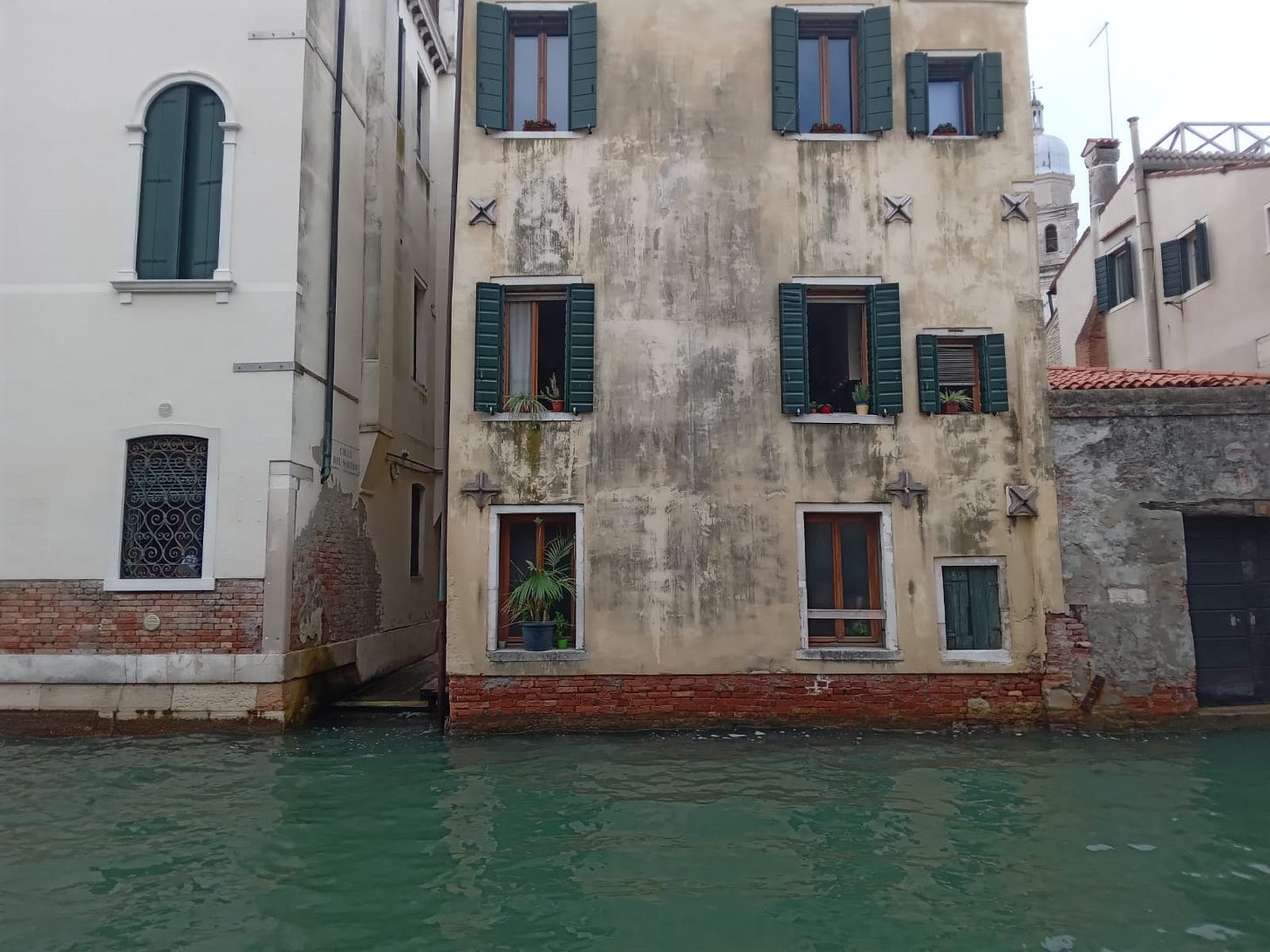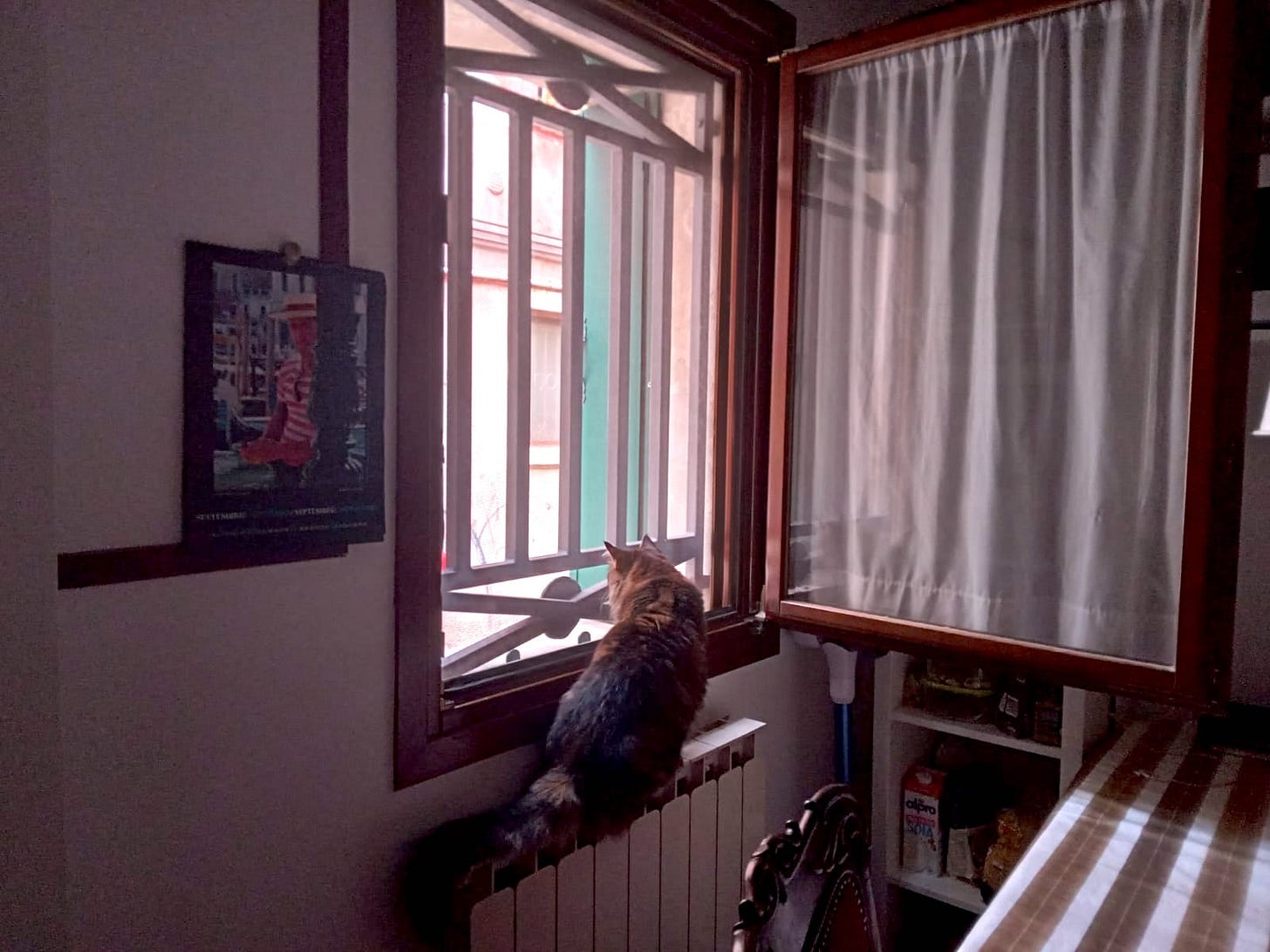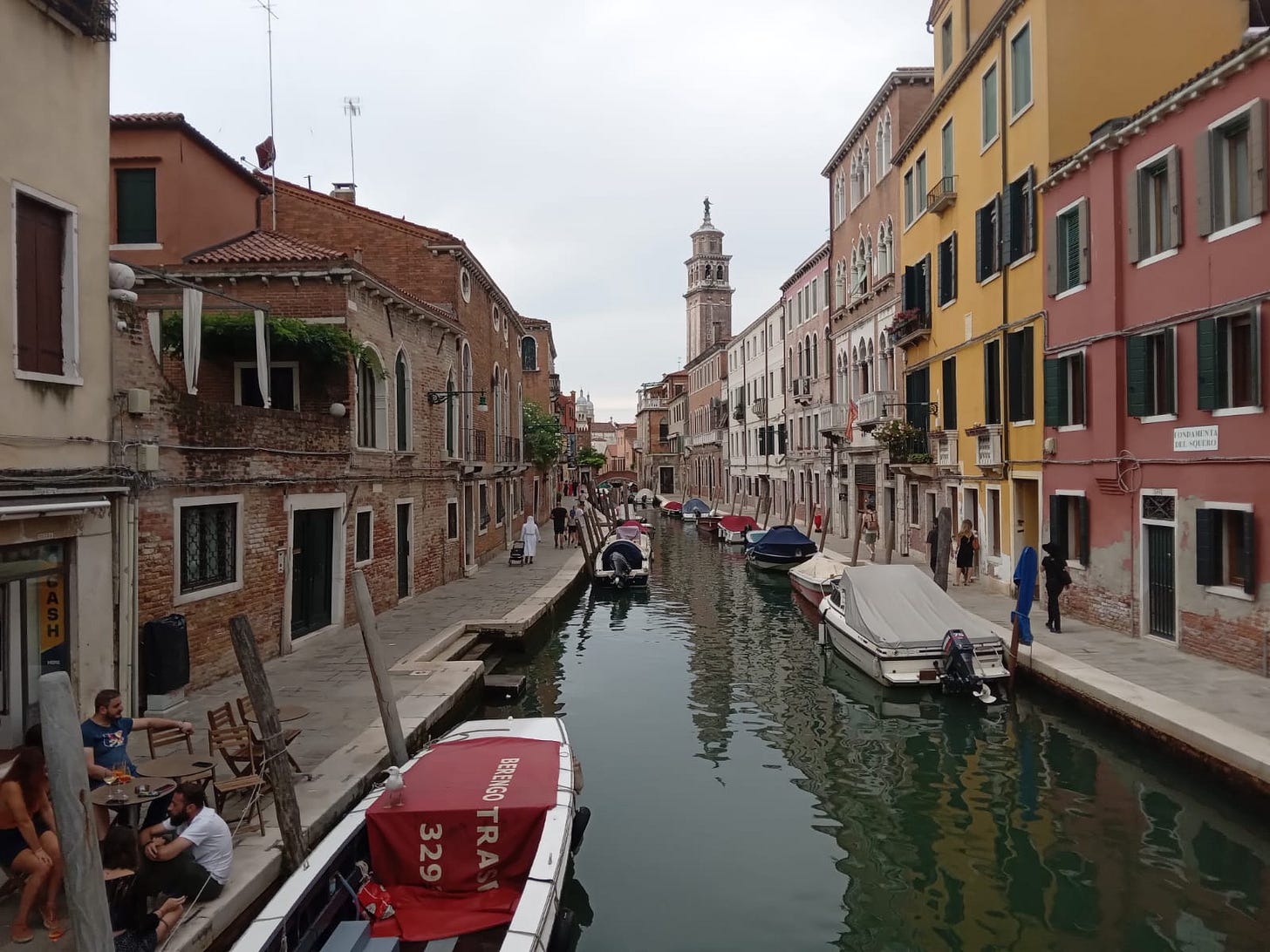The comfort of tourists
Field notes from Venice
Last week, I passed through Venice. Supposedly to visit the Biennale of Architecture, but I ended up seeing only Bulgaria’s pavilion on its villages emptied of residents. Anyways, ‘isn’t Venice reason enough to go to Venice?’
I have the fortune of having a friend who is a real-life flesh-and-blood resident of the city and lives in a quiet calle in the centre, in a little house on two floors with a large fluffy cat that used to belong to a family of criminals. Upon my arrival, we immediately went out to get ourselves a Spritz and a glass of light white wine; and then the early afternoon easily became early morning, as though time itself were Venetian and shaped like one of its twisted alleyways.
The following morning’s bar offered a selection of Italian natural wines (some very acidic, others almost pungent) with classic crostini, bread with cod or anchovies. The small bar was on a canal. Two elderly local men vivaciously chatted at large on the inside; the baristas occasionally sipped at their wine; at one point, we were the only ones on the wooden dock in the back, seated on the bare planks with our feet dangling over the quiet morning water, just us and our glasses.
In the eyes of the tourists that continuously flowed over the little bridge above us, through which I could see perfectly well, we were quite the Venetian portrait (though I live in Rome and my friend is originally from Turin). In front of us, a beautiful apartment on the other side of the canal had a balcony full of green plants, with signs on sticks jutting out from the vases and providing information on the residents of the city of Venice. One sign exhibited the fact, which I had already heard from all the friends of my friend, that as of a couple of days, more buildings in the Venetian city centre were occupied by AirBnBs and the like than by residents. It may seem odd to outsiders accustomed to the idea that Venice has by now been sieged by outsiders that this is actually a recent event; but the tourist throngs are quite content as day-trippers or as residents in those tall anonymous hotels in Mestre that help usher our way into the city. The Venetians I met were really quite upset by this latest development.
But what is a Venetian, after all? Might it be that, invaded as they are, Venetians have come to be defined through their negative [the tourist]? And as a result, have become quite a simple thing? Venetians are not tourists. They are those who live in Venice. (So perhaps I am not deluding myself when I say that last week I was fleetingly Venetian.)
I see a John Berger-style dichotomy at play: tourists watch residents; residents watch tourists watch residents. (I live in Rome and am accustomed myself to the tourists’ gaze; and when it focuses on my figure, I feel the satisfaction of feeling my life coming into sharp relief.) Perhaps I think in a too archetypally feminine way, but slightly contra-Berger I believe it is the being watched that is more life-affirming than the watching. It may imply a performativity to the way we live, as a show put on for others, but at least it is also a valorisation of that inevitable show. And what a show! The Venetians nonchalantly turning the sharp corners of alley ways, hopping onto motorboats, retreating into humid houses overlooking canals, looking the elegant creatures of the lagoon, and knowing it perfectly well. Tourists are ubiquitous in Venice and thus a Venetian will never stop performing (in the Butlerian sense of doing, rather than simply being, an identity[1]) their Venetianness. And while many cities, especially in western Europe, have similarly high influxes of tourists, the proportion of tourists-to-residents for a city of Venice’s size is unique.
At the first bar on the first day, tucked right around the corner from one of the main tourist thoroughfares, my friend had commented on the strangeness of being surrounded every day by such happy people. The tourists. He said that it must be unique in the world, to go out on one’s daily routine and constantly witness that special joy of people on vacation seeing something marvellously beautiful for the very first time. ‘We are their foil,’ he said. The Venetians cannot replicate the exuberance of tourists in their everyday living, but they can try to get comfortable as their alter ego: as melancholic, languid, subtle beings; the blurry shadows in that particular water of the lagoon.
It is this the slight comfort tourists can give: they come a-visiting while you actually reside here (almost as if you were the real person, and they holograms or ghosts); they must travel with their fanny packs to arrive while you are surrounded by this marvel every single day; they are happy-go-lucky explorers while you are used to it, you are simply going about your business, elegantly detached from the stimuli around you. Not everyone may desire to live in this cast, but at least it is one, an identity, one that may give a shine to the duller hues of everyday life.
It is also one that unites the non-tourists of Venice. Being a resident (that is, a non-tourist) is the lowest common denominator of a real (as in felt, experienced) Venetian identity. This is not true of many other places, where residency is essentially a legal matter of convenience and other roles or identities (e.g., one’s profession, immigration status, nationality) may tend to bear more importance.
On my only evening in Venice I went to the Multisala Rossini, a cinema subtly inserted in the geometry of the city, to see a newly completed documentary called Cielo aperto (Open sky) by Ruggero Romano. The auditorium was filled with residents. Ruggero is a young documentary filmmaker from Turin who decided, almost two years ago, to move to Venice with the idea of capturing the lives of the people living here. It is a curiosity that many tourists, I imagine, also have: how do these creatures actually spend their days? His only category of interest was residency, the people who were drawing out their lives in this city and planned to continue doing so.
Quite a few characters appear in his film: an affable elderly gentleman who is a rower; his trainee, a younger man who recently immigrated from an African country; a young French woman who studies in the city; a group of young alternative musicians and music producers from all over Italy (including my friend); two young girls and a boy who are growing up in the city; and more. The city itself—its characteristic buildings and piazzas, with its criss-crossing canals and archways, marbles and stones—never made a real appearance, only at times in the background of the characters’ movements. Still, we knew it was Venice; and thus I believe all of us spectators, from the newly arrived to the older Venetians and the want-to-be tourists seeing it online, watched with a similar kind of awe, without which Venice might be very lonely indeed.
Alyssa Erspamer
[1] Judith Butler, Gender Trouble: Feminism and the Subversion of Identity (London: Routledge, 1999).




